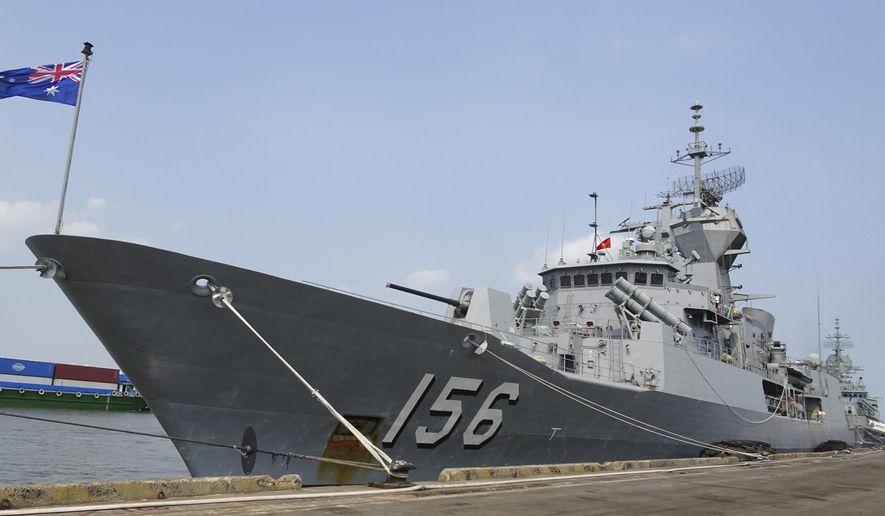SEOUL, South Korea — A Chinese destroyer has injured divers operating off an Australian frigate in a highly unusual incident in international waters off Japan’s coast.
According to information released by Canberra on Saturday, the frigate HMAS Toowoomba, en route to a port call in Japan last week, had deployed divers to clear fishing lines that had snarled its propellers when it was approached by the Chinese vessel. The Chinese government later identified it as the Sovremenny-class guided missile destroyer Ningbo.
Though the Australian vessel had put out signals warning of the presence of divers, the Chinese warship engaged a hull-mounted sonar.
Sonar pulses, usually used to detect submarines, can have deleterious effects on divers’ hearing and internal organs, depending on intensity and frequency. The Australian divers exited the water with “minor injuries.”
The incident is becoming an embarrassment for Canberra, given that it was made public only after Australian Prime Minister Anthony Albanese had met Chinese President Xi Jinping at the recent APEC forum in San Francisco.
The encounter has puzzled naval pundits, with some suggesting incompetence rather than malice was behind the Chinese destroyer’s actions.
“There is no logic in putting sonar on divers in the water,” one maritime expert told The Washington Times. “You will hurt them — sonar can bleed your ears out — and even the Chinese are not in [favor] of hurting Australians.”
Others were not so charitable about the Chinese ship’s motives.
“The Chinese military’s decision to injure Australian divers by using hull-mounted sonars on its destroyers is unacceptable,” said Mississippi Sen. Roger Wicker, the ranking Republican on the Senate Armed Services Committee, in a statement Sunday. In the statement, he noted that it occurred just as President Biden and Mr. Xi were holding their own tension-lowering talks at APEC.
“While the Biden administration celebrates hollow U.S.-China ’working groups’ as meaningful progress and Xi Jinping receives a standing ovation from American CEOs, the United States and our allies need to continue the hard work of bolstering deterrence in the Indo-Pacific,” Mr. Wicker said.
The Pentagon in recent weeks has made public its own list of dozens of near misses and what it calls unprofessional and unsafe maneuvers by Chinese ships and planes just in the past few years, warning such conduct could lead to an unintentional clash between the two superpowers.
Australia’s own official comment accused the People’s Liberation Army Navy ship, the Sovremenny-class guided missile destroyer Ningbo, of “unsafe and unprofessional” conduct, rather than intentional aggression.
Australian Defense Minister Richard Marles tweeted on social media Saturday that Canberra “has expressed its serious concerns to the Chinese government following an unsafe and unprofessional interaction with a People’s Liberation Army Navy destroyer.”
Accounts in the Chinese official media sharply contradicted the Australian press accounts, suggesting Canberra delayed its protest because the Royal Australian Navy vessel was not where it was reported to be.
The Chinese accounts said the Australians underplayed the fact that the two ships had been in communication before the damaging sonar blasts were released and that it may have been the Australian vessel that ignored warnings regarding its divers.
Chinese assets have been accused of using a range of nonlethal weapons, from water cannons to lasers, in disputed waters off the Philippines. And it is possible that Chinese sailors were testing their own systems.
“You use sonars to verify ranges and they might have been testing the sonar or working out the echo strength of the sonar,” the source told The Times. “The amount of sound you get back is useful for navy people to know.”
The incident is generating political blowback for Mr. Albanese, who is trying to pull back from the hard-line policies of his predecessor Scott Morrison, which led to a sharp deterioration in bilateral relations with Beijing.
Earlier this month, Mr. Albanese paid a four-day visit to China during which he met Mr. Xi, earning praise from Chinese media for his positive tone.
Questions are now being asked over the timing of the sonar release, given that Mr. Albanese met Mr. Xi for a second time at the San Francisco APEC forum, after the maritime incident had occurred.
On Sunday, opposition Shadow Defense Minister Andrew Hastie said Mr. Albanese “must explain why he chose to wait until after he left the country to disclose this information, and whether he raised it directly with President Xi Jinping at APEC.”
Australian media report that they have been unable to gain clarification from Canberra’s Chinese Embassy about either the incident itself, or about whether Mr. Xi and Mr. Albanese discussed it.
The Australian vessel’s mission in the region was unconnected to China. According to the Australian Defense Ministry, the HMAS Toowoomba is engaged in the international mission enforcing U.N. sanctions against North Korea.
• Andrew Salmon can be reached at asalmon@washingtontimes.com.




Please read our comment policy before commenting.